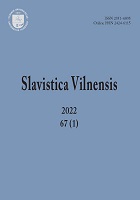Грамматические особенности московской редакции требника сер. XVII в. (на материале сопоставительного исследования «Требника» Никона 1658 г. и «Требника» Петра Могилы 1646 г.)
Grammatical Features of the Moscow Edition of the Trebnik in the Middle of the 17th Century (on the Material of a Comparative Study of Trebnik by Nikon in 1658 and Trebnik by Peter Mohyla in 1646)
Author(s): Molkov Georgiy, Miliausha SharikhinaSubject(s): Morphology, Eastern Slavic Languages, Eastern Orthodoxy
Published by: Vilniaus Universiteto Leidykla
Keywords: Revision of the Church Books; morphology; grammar; Church Slavonic; 17th century; Trebnik;
Summary/Abstract: The paper studies the grammar features that characterize the Moscow revision of the Book of Needs (Trebnik), composed under patriarch Nikon (1658). The research is based on a comparison of Nikon’s and Peter Mogila’s (1646) Trebniks. The study confirmed the scientific statement that Nikonian editors revised the Trebnik in accordance with the recommendations of the Moscow edition of M. Smotritsky’s Grammar. This is shown, for example, in the use of certain endings in the nominal and adjective declension and of the imperative indicator (in the verbs of the first conjugation in the 1st and 2nd persons of the plural). The emergence of hyper-correct phenomena points at to obligatory character of the corrections. One of the main directions of the Nikonian edition was the elimination of grammatical variability and homonymy. To this end, editors fixed one form for expressing grammatical meaning in those cases when the grammar allowed variations, for example, the use of the ending -ѣхъ in the local masculine and neuter plurals, the elimination of the enclitic forms of personal pronouns in the dative case in the adnominal position and their replacement by possessive pronouns, the use of reflexive verbs to express passive in place of combinations of passive participles with the verb byti (быти).
Journal: Slavistica Vilnensis
- Issue Year: 67/2022
- Issue No: 1
- Page Range: 23-40
- Page Count: 18
- Language: Russian

